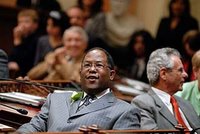
From The Los Angeles Times…
-----------------------------------
Activists hailed for improving neighborhoods
The L.A. advisory group Empowerment Congress honors seven residents and organizations. One woman worked to end a glut of liquor stores.
By Robert J. Lopez, Times Staff Writer
Elizabeth McClellan remembers walking past the liquor stores that dotted her South Los Angeles neighborhood, where addicts smoked crack cocaine and drank alcoholic beverages wrapped in brown paper bags.
She and her neighbors began organizing with the help of a then-newly formed advisory group called the Empowerment Congress. Eventually, they were able to reduce the number of area liquor stores and crimes.
On Saturday night, 15 years after McClellan began working with the congress, she and six other activists and organizations were honored at a dinner at USC celebrating the group and the people who helped turn a lofty experiment in micro-governance into the prototype for L.A.’s neighborhood councils.
Among those recognized were a Cal State L.A. educator who began a certificate program to train gang-intervention workers and a Jefferson Park couple who rallied residents against dozens of sex offenders living in a halfway house near an elementary school and church.
“It’s very, very exciting and deeply encouraging that these people and others continue to commit themselves to making the space they occupy better,” said state Sen. Mark Ridley-Thomas (D-Los Angeles).
He started the Empowerment Congress in 1992, when he was a Los Angeles councilman representing parts of South Los Angeles. The group, formed after the rioting over the Rodney G. King police beating verdict, was seen as a way to spark activism by electing people to local councils and hosting workshops on such topics as community organizing and leadership training.
The group has spread to parts of Ridley-Thomas’ Senate district in Hancock Park and Culver City and seeks nonprofit status, said Chairwoman Kara Carlisle, vice president of the city Human Relations Commission.
The congress has no formal authority, but it has become a potent organizing tool for activists such as McClellan, who worked with other members to stop the proliferation of liquor stores around her neighborhood at 91st and San Pedro streets.
Many of the stores had been damaged or burned down during the riots and were seeking to reopen. McClellan, 73, said residents were able to get the attention of city officials and stop owners who had allowed their businesses to become crime magnets from reopening. “We awakened City Hall to the fact that they had a responsibility over land-use authority,” she said. “Prior to that, everybody closed their eyes.”
Another activist honored Saturday, Bill Martinez, began working with Ridley-Thomas’ council office in the early 1990s after becoming the director of a city-sponsored gang-intervention program. Six years ago, Martinez helped start a 15-week course at Cal State L.A. that has trained more than 350 gang-intervention workers. The workers, many of them former gang members, learn to teach gang leaders conflict-resolution skills.
The workers are also taught about community organizing based on the model developed by the Empowerment Congress, Martinez said. “These guys can take that to the neighborhoods they’re working with and do the same thing,” he said.
Two other honorees, Michael and Dollinda Sampson, became involved with the congress five years ago when they discovered that an adjacent property was a halfway house where 31 registered sex offenders lived.
The men often peered over a waist-high fence into his yard, frightening his then-12-year-old daughter, Sampson said. The house, near Arlington Avenue and Exposition Boulevard, was about three blocks from a church and elementary school. “We had kids going back and forth to school,” Sampson said. “It was not a comfortable feeling.”
He said he and his wife met with congress members, who helped residents hold meetings and stage a protest march and sit-in at the house, where they met with the owner. He ultimately moved the men out, but recently started a sober-living residence for half a dozen drug offenders, Sampson said. “We’re still fighting,” he said.
Other honorees were Lark Galloway-Gilliam, who has worked to provide healthcare for low-income families, and the Korean American Coalition and City Watch, which have organized neighborhoods across L.A.

No comments:
Post a Comment